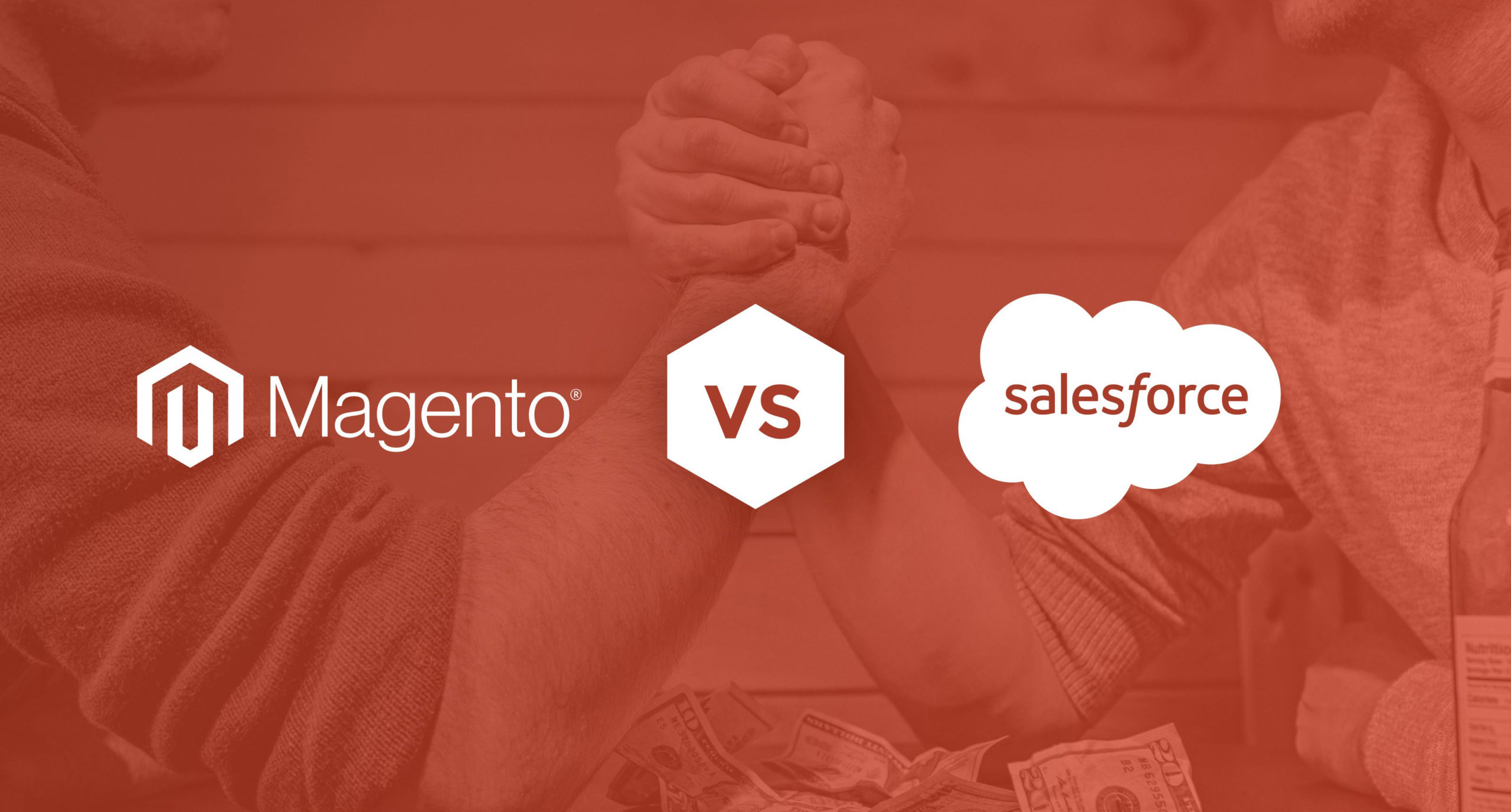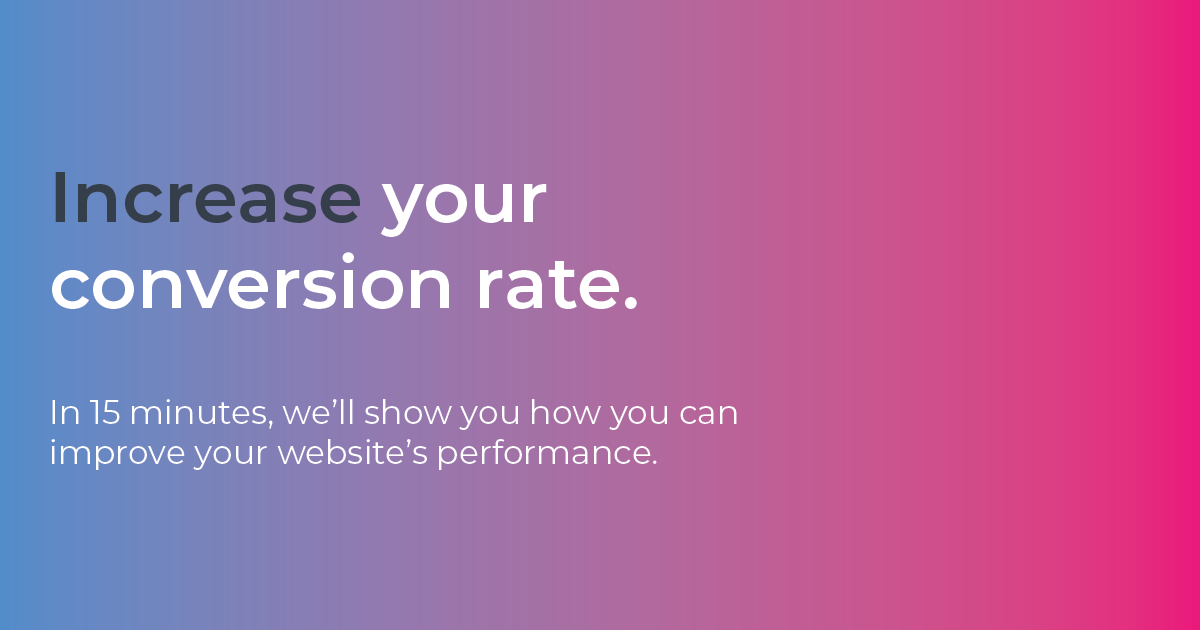You’re scaling up quickly and looking for a robust eCommerce platform that can adapt to suit your needs as you continue to expand. With so many options out there, you’re right to be reading about comparisons between the big guys in order to figure out which solution will be the right fit for your unique situation.
Magento Commerce and Salesforce Commerce Cloud (or as it was known before the acquisition, Demandware) are two great options to consider. Both are used by some big companies, so with either choice you’ll be in good company:
- Magento: Nike, Olympus, Rosetta Stone
- Salesforce: Adidas, GoPro, Godiva
Both platforms allow medium and large companies to promote and highlight their products on amazing websites with tons of customization. We’ll go through some of the major differences between the two platforms to help you figure out which one would work better for you.
Comparing Magento and Salesforce Commerce Side By Side
Open Architecture
Open architecture is used to make upgrading, integrating, and changing components of a software easier. Magento operates as a platform-as-a-service (PaaS) versus Salesforce Commerce Cloud being a software-as-a-service (SaaS). With Magento as a PaaS, it allows for flexibility, extensibility, and customizability as developers can make changes as needed directly into the cloud without having to alter the underlying infrastructure. As a SaaS, Salesforce is much more limited and is a closed book when it comes to being able to make these changes.
Single Platform for B2B + B2C
Business to business (B2B) and business to customer (B2C) operations are significantly different and unique when it comes to eCommerce and what features are available to be able to manage both types of operations. Magento Commerce comes with a native B2B platform, allowing for robust B2B capabilities right out of the box.
Salesforce Commerce Cloud has nothing of the sort. Meaning in order to possess both B2B and B2C capabilities, you’ll have to purchase another B2B-specific eCommerce solution and spend time and money trying to integrate it.
Developer Community
In the world of web development and eCommerce, it’s important to have an extensive community of peers, experts, and development partners available in order to maximize resources and expand the possibilities of customization. With Magento, there are more tech partners, more solution partners, and a community of 350,000 developers, the largest of any platform. With Salesforce, there is a large community of developers, but it’s for their CRM, NOT their eCommerce platform.
Thinking to the Future
With functionality updates and the integration of new features being an expectation for eCommerce platforms versus an advantage, the fact that Salesforce Commerce Cloud offers only small updates a few times a year puts them far behind Magento Commerce, who is constantly updating the platform with Progressive Web App capabilities, the implementation of 3D and VR visual product integration, and other immersive, innovative features that seem to come available one after the other.
With all this in mind, it’s no tough task to see that Magento Commerce outshines Salesforce Commerce Cloud. However, the reason that people even think to compare them is because Salesforce does set the industry standard for CRMs, leading many to believe that these strengths simply carry over to their eCommerce platform. As you see above, this is nowhere near the truth, and we’ll continue below with more comparisons to really go into the differences that reinforce this.
Features
While the features between the two are mostly similar, there are a few main features that are unique to each system.
Magento Commerce is a robust open-source system that can be built to suit the needs of both B2B and B2C businesses, while allowing for full customization and access to its marketplace of extensions. Some of the main features that make Magento stand out against Salesforce Commerce are:
- Magento Business Intelligence (BI): This is an amazing BI tool that brings in data from multiple sources (social media, CRM, sales history etc.), organizes it all in one place for easy access, and provides tons of premade reporting templates. This is a huge timesaver if your alternative is multiple spreadsheets!
- Content Management: Page Builder makes adding new sections to pages a breeze. Salesforce at the moment has a much more complicated process, which requires training or professionals, rather than your non-technical marketing or admin team. With Magento you can drag and drop custom or premade blocks and make your new pages look just how you want them without calling in the big guns.
- Scalability: The main appeal and the reason Magento is so popular among developers and business owners alike is that it grows with your business. Even if your company is still new and ramping up, you can rest assured that Magento will have the capability to scale with you as your needs change, traffic increases, and your whole eCommerce ecosystems needs to expand in complexity. For this reason, it is good to have a strong eCommerce partner at your side who can advise on ways to optimize your flows and work with you to improve your online storefront.
Salesforce Commerce unites eCommerce, offline store operations, and order management in one package. This software as a service (SaaS) model is great for brick-and-click companies or others who are operating both physical and online stores. However, Salesforce is much more focused on the B2C side of things, which leaves many B2B online vendors asking for more with this platform.
Features that Salesforce has to set it apart from Magento include:
- Einstein: No not Albert, rather Salesforce’s proprietary AI recommender system. This feature helps personalize the shopping experience through machine learning and is built right into Salesforce. Although it is important to note that each Salesforce Cloud has its own AI system, which is separate to others. This limits the analysis and insights that would be possible with access to more data.
- 24/7 Support: As part of its SaaS offering, Salesforce provides robust customer care which goes well beyond just basic code issues. Their team handles all the upgrades and patches, ensuring your store is always protected. Although, since this service is so comprehensive, it does account for the high price tag Salesforce comes with.
- Merchandising and Catalog Management: Salesforce really shines in this regard and is one of the reasons it’s really popular, especially among businesses working in fashion. The platform enables advanced promotions that can be applied at any stage of the process, task scheduling to allow for products to be queued ahead of time, and supports complex products, like subscriptions, bundles or grouped products.
Extensions
Don’t worry too much if something isn’t available straight from the out of the box setup, since there are plenty of third-party extensions and integrations on both eCommerce platforms. However, simply because Magento is the more popular of the two, there are more extensions available. If an integration for a lesser-known extension isn’t available for Salesforce, it could be quite costly to integrate it on your own.
Hosting
The major distinction between these two platforms is how they are hosted. Salesforce, unsurprisingly, uses a cloud-based SaaS solution for its eCommerce platform, just like its trademark CRM software. Magento is traditionally hosted locally as an on premise solution. However, recently the Cloud Commerce edition of Magento has been gaining popularity. It’s important to note that with Magento’s Cloud Commerce, while it is cloud-based, it is not a SaaS solution. As a result, many customers have continued to opt for the locally stored hosting with Magento.
Hosting on Salesforce with its fully managed SaaS service is a good option for those who do not want to handle their own updates and server maintenance, however this does come at a higher cost that Magento.
With Magento, you will need to manage your own hosting, but when you have a skilled team build up your entire website, they will oftentimes be open to a retainer for monthly upgrades and updates. Over time, this may end up more cost effective than Salesforce. Agencies like 121eCommerce will keep an eye on not just on hosting, but site functionality, integrations, and will make recommendations for other improvements they recognize could be beneficial.
Price
Although Salesforce has historically been the far more expensive option, recently they have made changes to their pricing to be a bit more competitive and accessible to non-enterprise level companies. That being said, it’s very difficult to compare the cost of building and running sites on Magento vs Salesforce. It will depend on a number of factors including, availability of integrations, amount of customization required, and Gross Merchandising Value. Both Magento and Salesforce have scaling pricing that depends on how much your sales are and both will require experts to build up or migrate your site.
Related Articles:
How To Evaluate eCommerce Platforms – What You Should Look For
Comparing Magento Vs. BigCommerce – Everything You Need To Know
Comparing Magento Commerce Vs. Shopify Plus- Everything You Need To Know
Comparing Magento Commerce Vs. Volusion- Everything You Need To Know



Leave a Reply
You must be logged in to post a comment.